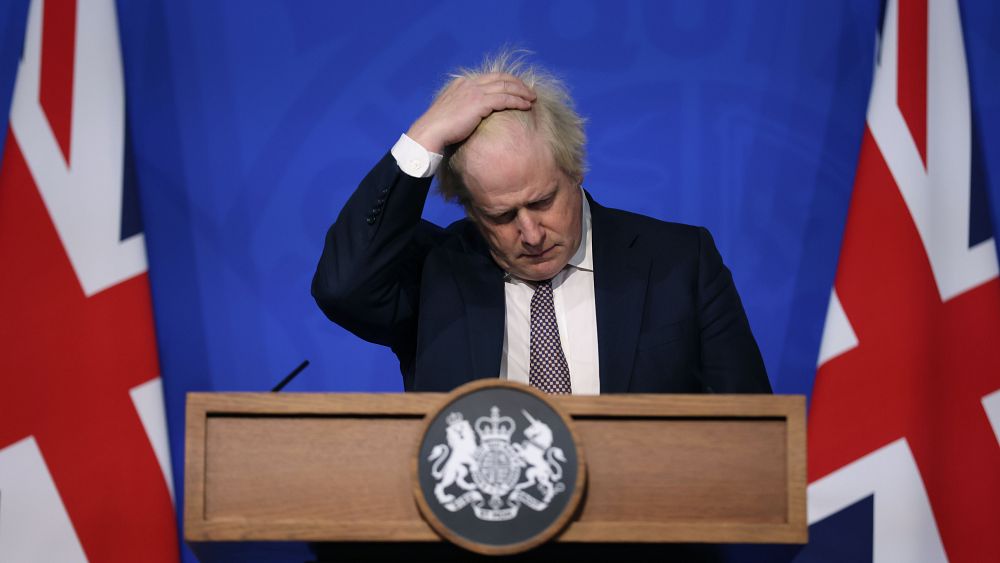
Boris Johnson faces MPs on Wednesday just hours after nearly 100 of his own party revolted against his move to introduce COVID-19 “vaccine passports” in the UK.
Britain’s prime minister was already under fire after a series of scandals and criticism of his handling of the coronavirus pandemic.
His weakened position at home is also being noted abroad, with questions being asked over the future direction of the UK’s relations with the EU — whether or not Johnson remains in Downing Street.
Tuesday night’s events in the House of Commons came amid concerns over rising cases of the Omicron variant. Nearly 100 Tory MPs voted against the government’s plan to introduce COVID passes in England, making entry to large venues — such as stadiums and nightclubs — conditional on full vaccination or a recent negative test.
Other measures, including compulsory vaccinations for health workers and mandatory mask-wearing in more indoor venues, also brought a party revolt, though to a lesser extent.
Although less stringent than equivalent restrictions in several other European countries, the move to bring in “vaccine passports” in particular was vehemently opposed by backbench MPs who have long been sceptical of coronavirus restrictions and government policy.
But other sections of the party also weighed in to defy the leadership — even though Johnson had appealed personally to MPs to back the measures. They were only passed thanks to the support of opposition parties.
The revolt did not come out of the blue. It followed a number of events that have shone a spotlight on the prime minister’s conduct and that of those around him — sparking anger among the public and in Conservative ranks.
Most recently, a series of revelations in the “partygate” affair has prompted accusations of hypocrisy among Johnson’s inner team. While the country was locked down last Christmas and families were unable to come together, Downing Street advisers allegedly held parties in breach of COVID regulations.
A Tory ex-mayoral candidate quit his post as chair of a London Assembly committee on Tuesday after a newspaper published a photo of one alleged gathering.
Recent months have also seen government U-turns and accusations of sleaze — in an echo of scandals that contributed to the downfall of a previous Conservative government in the 1990s.
Johnson’s attempt to change parliamentary rules to protect Owen Paterson, a Brexiteer ally who had fallen foul of them, caused disgust among other Tory MPs not just the opposition. The backlash forced a humiliating climbdown.
Other mishaps, such as a shambolic speech to business leaders, have also raised eyebrows — prompting one reporter to ask the prime minister whether “everything was OK”.
Despite a successful COVID vaccination campaign — including the current drive to increase the number of third doses — cases have continued to soar since the summer when restrictions were lifted.
Record numbers of migrants crossing the English Channel in the autumn — despite government pledges to stamp out people smuggling — have also added to a sense that it is failing to get a grip on events.
All this has detracted attention from issues which not long ago had fellow Tories falling into line to cheer on the prime minister — for instance the government’s post-Brexit dispute with the European Union over the Northern Ireland Protocol, or with France over fishing rights and migrant crossings.
Instead, the focus firmly on the performance of the government and of Boris Johnson in particular. Some commentators even attribute a perceived softening of the UK’s stance towards the EU over Northern Ireland, to the prime minister’s weakened position.
There has even been talk of a potential leadership challenge, with the names of Chancellor (finance minister) Rishi Sunak and Foreign Secretary Liz Truss mentioned in particular. But so far the rumblings of discontent do not seem to have translated into any significant formal move.
Boris Johnson, who recently took time out after his wife had a baby, will no doubt be hoping that the lid can be kept on the pandemic over the holiday period, and that the New Year will provide an opportunity for a fresh start.
In the meantime all eyes are on a by-election on Thursday in Shropshire North, an English constituency bordering Wales, traditionally a very safe Tory seat but which could fall to the Liberal Democrats. If it does, the questions over Johnson’s leadership will surely intensify.